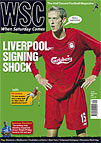 Why are French club owners smiling so much? That'd be the massive cash windfall they're getting from Canal Plus, says Ben Lyttleton
Why are French club owners smiling so much? That'd be the massive cash windfall they're getting from Canal Plus, says Ben Lyttleton
Lyon president Jean-Michel Aulas made a good point during the protracted negotiations with Chelsea over the transfer of Michael Essien. Not only did his club not want to sell their best player to a Champions League rival, he said, but they did not need to.
Part of the reason for that is down to the astute business skills of Aulas himself: the former handball player took over the club in 1987 when they were in the second division, and has ensured steady progression to their current status, as French champions for the last four years and serious contenders for the Champions League.
But the other reason is that this year, all French clubs will receive a bonus payment of at least £15m, thanks to a bumper TV package from satellite broadcasters Canal Plus, who are paying £420m per season for a three-year exclusive deal to show all Ligue 1 games. “We will be getting the same sort of money that teams like Arsenal and Manchester United have been getting for years,” said Aulas. “What it means is that we will be able to further develop the stadium and our academy and our training-centre, and we will be able to afford more players. We now have the means to escape from the traditional financial crises that hit French clubs.”
Last season, Canal Plus showed two of the weekend’s three games with TPS, another satellite broadcaster, airing the Saturday night fixture. But this season Canal Plus will show all three games over a weekend, in a deal seen as a culmination of football’s rise in popularity ever since France won the World Cup in 1998. Match attendances in France, like the TV viewing figures, have increased every year since then: this is some achievement considering the regular export of Ligue 1’s leading scorers like Sonny Anderson, Didier Drogba and Djibril Cisse to foreign leagues; and the fact that last season was one of lowest-scoring in Ligue 1 history, with an average of just 2.17 goals per game (compared to 2.6 in England and 2.9 in Germany).
The money has had an obvious impact already, with clubs spending more than ever on recruitment and contract renewals this summer. Lyon, for example, were able to sign highly-rated France international Benoit Pedretti on a better salary than he earned at Marseille as well as Norway international John Carew and defender Sylvain Monsoreau from Sochaux. “We may not be able to go and buy Ronaldo but we don’t have to sell our star players at the end of every season as we can offer salary packages to stop them from going abroad,” said Aulas, before keeping Mahamadou Diarra from Arsenal by improving his contract.
Other sides have been busier than ever before, with Monaco buying Olivier Kapo, Gerard, and young talents Olivier Sorlin and Camel Meriem, Paris Saint-Germain splashing out for Bonaventure Kalou from Auxerre and Vikash Dhorasoo from AC Milan and even Toulouse spending big on young stars Bryan Bergougnoux from Lyon and Jeremy Mathieu from Sochaux.
“Though no-one in their right mind would pretend that the French league has the same worldwide appeal as the Premier League, the top-division French clubs are now almost on a par with their English counterparts in terms of money” said Darren Tulett, the popular pundit who covers English football for Canal Plus. “It should mean that over the next year or two, there will be a continuation of French clubs doing well in Europe. They have a better chance now simply because they have more money to play with.”
What effect this has on a France team still in transition remains to be seen although Raymond Domenech, the coach, has always insisted that playing for a foreign club is no guarantee of international football, as it was under one of his predecessors Roger Lemerre. French players now have more incentive to stay at home, especially as Domenech is more likely to pick a regular starter at a French club than a reserve for a foreign side: of the 18 picked for France’s recent friendly against Hungary, only five were based outside France.
The new financial situation in French football has seen one other transfer this summer, as former Auxerre coach Guy Roux ended his 20-year association with rival station TF1 to join the broadcast team on Canal Plus. If ever there was proof that French football has changed, it is that.
From WSC 223 September 2005. What was happening this month